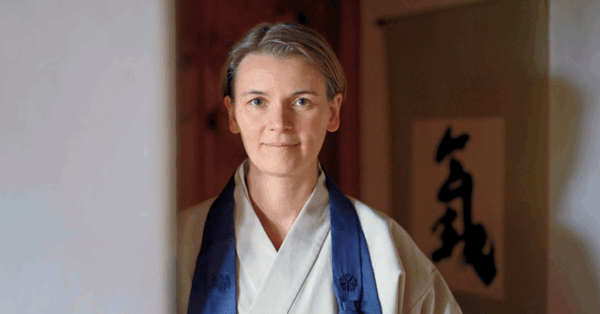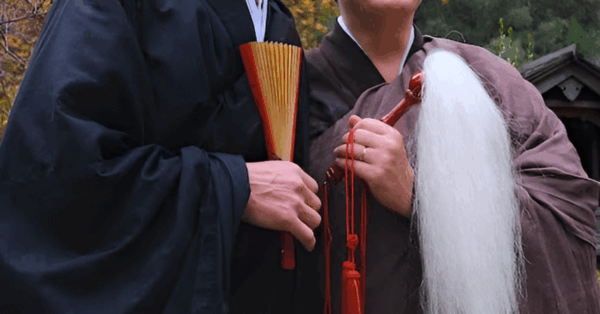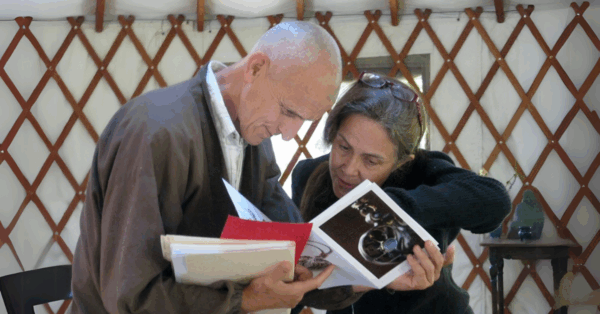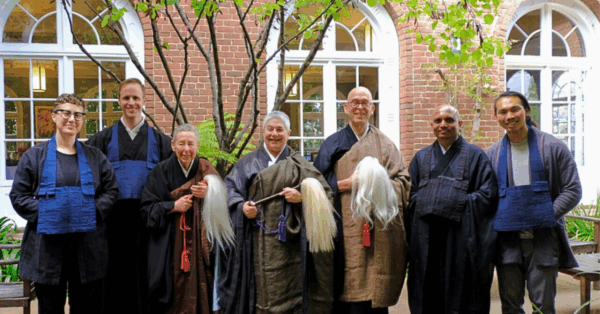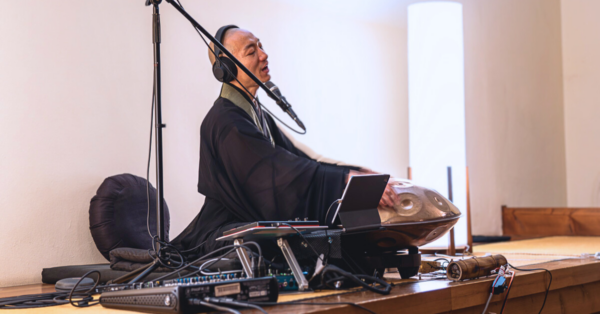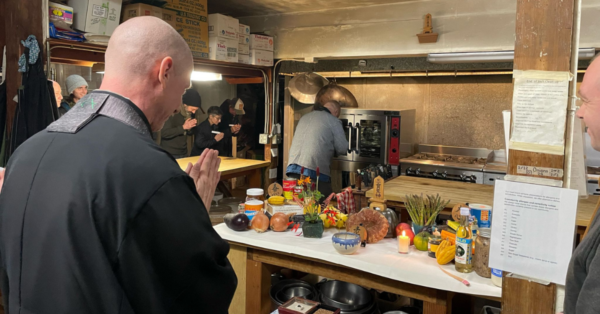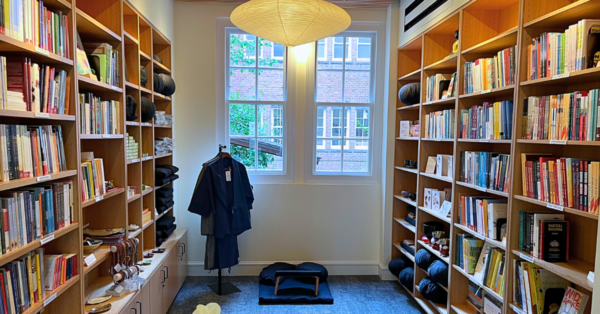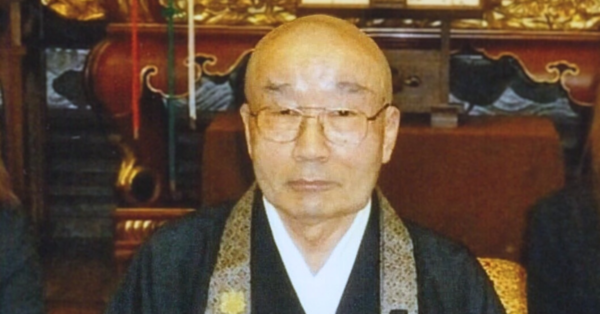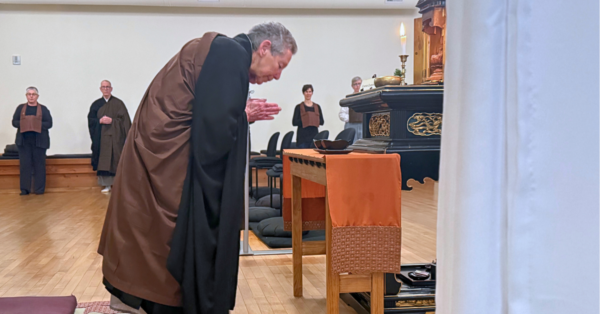In this long weekend retreat at Tassajara, Robert Do-An Thomas and Samantha Ostergaard lead participants in taking up the Bodhisattva’s practice of turning each moment of our lives into a moment of acceptance, compassion, and awakened activity that benefits ourselves and others. Through yoga, meditation, and discussions about Zen, we will restore and realign with our deepest intentions as human beings. You’ll leave renewed and ready to extend the Bodhisattva’s “work” of living life for the benefit of all beings.
Your September Zen Mind, Yoga Body retreat at Tassajara is a special three-day retreat, titled “The Bodhisattva’s Work,” can you tell us what that is about?
Robert Do-An Thomas: Well, the retreat happens over Labor Day weekend, and so we thought that we could make it a tribute to “work” from a Zen Buddhist perspective. From that perspective, there’s our outer “work” and there’s our “inner” work. The outer work is where we manifest our deepest intention to be a positive force for good — to benefit and help others in whatever way we can. And the inner work is the effort we make to see and touch and connect with our true nature. For it’s from this place of knowing our true nature that we can truly be of service and benefit — not only to ourselves — but also to others, and actually, to everything.
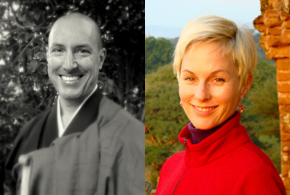 Robert and Samantha |
How will the Zen and Yoga complement each other and how will it help the participants explore this outer and inner work?
RT: In Zen Buddhism, the archetype for someone who works on their inner and outer worlds is called a Bodhisattva. So we’ll explore how to take up the Bodhisattva’s practice of cultivating the Bodhisattva mind which turns each moment of our lives into a moment of acceptance, compassion, and awakened activity that benefits ourselves and others. This is the mind that helps us and helps others simultaneously; Suzuki Roshi, founder of Zen Center, once said, “The Bodhisattva mind is the mind which should be continued forever. Whether you attain enlightenment or not. Whether you are a buddha or not.” So our practice of having the Bodhisattva mind is even more important than enlightenment and becoming a Buddha.
Samantha Ostergaard: We bring zazen (Zen meditation) into the entire retreat so that our Iyengar-based yoga practice is infused with attention to the immediate experience of the breath and the body in each pose, which in turn prepares both the body and mind for the actual sitting practice. The alternating yoga and meditation practices throughout the retreat provide a lot of time to work on both the mind and the body — exploring the “inner world” of our sensations, thoughts, ideas, emotions, and the “outer world” that is moving and active, and is all about the consequences of our actions. With close, careful attention to both, and a lot of kindness for ourselves, we can let go and open up in new ways to the possibilities of our life.
RT: We’ve found that a combination of yoga practice and sitting zazen practice can help people to deal with grief or sadness or anger or other issues in their lives — seeing the things that are preventing them from moving forward in their lives. We encourage everyone to pay attention to all aspects of their experience, including their thoughts, emotions, and physical sensations. Then we’ll stop, sit and simply notice what’s happening. And then we follow with conversations and explore our attachments or mental habits, which connects the body and mind practices with the actual conditions in our lives. We encourage participants to bring this kind of awareness and the Bodhisattva intention into every aspect of their lives, extending it into the activity of the pose and then into doing dishes, or laundry, or while sitting at their desk at work.
What will the retreat participants leave with?
SO: We do yoga that’s very invigorating but we also have longer yoga sessions where people can rest and let go of tension, and really connect with themselves in a deep way. I think the kind of retreat we offer creates a refuge for people to really let go, and then they can return to their lives with a fresh way of being with the people and challenges that face them.
RT: Yeah, that’s true, an experience of letting go, and opening up; and in this case, to a different way of thinking about what their life’s “work” is. We always encourage people when they come to our retreats to forget what happened before they came, or what will happen after they leave, and just allow some time to take care of themselves. This is a time to rest, rejuvenate, renew, and also to connect with others who are also searching out ways to practice, to transform their lives, and find out how to bring their deepest intentions into reality. We hope that by exploring the compassionate path of the Bodhisattva people will feel encouraged to find or follow their own path, and then share their practice with the world!
Explore the Bodhisattva’s work at Tassajara through yoga and Zen meditation with Samantha Ostergard and Robert Thomas in Zen Mind, Yoga Body: A Special Labor Day Retreat from September 2-5.


